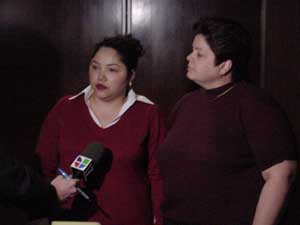-
- Golf club saga illustrates difficulty enforcing gay rights laws
- Gay bishop offers concession to conservatives over conference
- Despite state law, Massachusetts firms deny spousal benefits to same-sex couples
- The GLBT year in health
- Gay detective finds support instead of bias
- Same-sex marriage divorces begin
- National News Briefs
- World News Briefs
san diego
Tentative ruling issued in fertility discrimination suit
Case heads to trial in March
Published Thursday, 23-Dec-2004 in issue 887
A San Diego Superior Court issued a tentative ruling Oct. 28 in favor of a lesbian woman denied fertility treatment in the summer of 2000 by a local medical group after 11 months of preparatory treatment.
The Superior Court ruled that physicians cannot selectively treat patients in a for-profit medical practice in ways that violate the Unruh Civil Rights Act, the California law that prohibits businesses from discriminating against customers.
The defendants asked the Court of Appeal to review the ruling in the first week of December, but the Court of Appeal has not yet acted on that request. The case is set to begin trial in March 2005, and is expected to take seven to 10 days.
The ruling, which cited the court case Catholic Charities of Sacramento, Inc. v. Super. Ct., said when “followers of a particular sect enter into commercial activity as a matter of choice, the limits they accept on their own conduct as a matter of conscience and faith are not to be superimposed on the statutory schemes which are binding on others in that activity.”
“This is commercial conduct, in an area that is regulated by government to protect members of the public,” said Jennifer C. Pizer, senior staff attorney in Lambda Legal’s Western Regional Office, who is litigating the case. “It is not a religious worship, and the fact that there may be religious beliefs that each practitioner brings into the workplace, that may be absolutely true, but that does not transform the practice of medicine into religious ritual – it is the practice of medicine for a fee, and that is a commercial enterprise that is regulated by the state.”
After Drs. Christine Brody and Douglas Fenton of North Coast Women’s Care Medical Group refused to inseminate her, Guadalupe “Lupita” Benitez, who has polycystic ovarian syndrome, was forced to find another provider that was not in her healthcare plan and had to start the insemination process over again.
Prior to beginning treatment, Brody allegedly told Benitez that because Benitez’s sexual orientation conflicted with her religious beliefs, she would not inseminate her, but would arrange for one of her colleagues to do so. After the drug Clomid stimulated ovulation and invasive testing was administered, Brody referred Benitez to Fenton, who also refused to inseminate Benitez based on personal religious beliefs.
“It is important for doctors and other healthcare professionals to understand that the civil rights laws apply to them, because discrimination in healthcare settings has very significant adverse impacts on public health,” Pizer said. “And we know that lesbians and gay men experience discrimination in healthcare settings and that often deters them from seeking routine healthcare.”
Because North Coast Women’s Care was the only Ob/Gyn specialist covered under her health plan, Benitez, who works for Sharp Mission Park and is insured through them, paid thousands of dollars to an Ob/Gyn outside of her health plan in order to receive fertility treatment.
She sued in July 2001, but the lawsuit was originally thrown out of court due to a ruling that stated federal law regulating employee benefits plans prohibits a civil rights claim against doctors whenever an employer-paid health plan pays for the doctors’ services. In 2003, Benitez appealed the decision and won her right to sue North Coast Women’s Care. The state appeals court decision was the first ruling of its kind in the nation, allowing a patient to sue their healthcare provider if they are discriminated against due to their sexual orientation.
“Many non-gay people are not as familiar with who we are, and don’t yet understand that we create families and become parents, and that we have the same legal rights – the same constitutional rights – to create families,” Pizer said.
Benitez’s discrimination suit names North Coast Women’s Care as a whole and Brody and Fenton as individuals. Claims include sexual orientation discrimination, breach of contract, breach of implied contract, breach of the covenant of good faith and fair dealings, negligence, intentional infliction of emotional distress, deceit and fraud.
Carlo Coho, the attorney for Drs. Fenton and Brody, did not respond to a request for comment from the Gay & Lesbian Times.
“In a nutshell, they are making a constitutional argument, and it is similar to arguments we have seen in other contexts,” Pizer said of Fenton and Brody’s defense. “We have seen this argument in the housing area, in employment settings, and now we’re seeing it in the business context… these arguments are attempting to carve a big hole in the civil rights laws and permit exactly the kind of harm that the Legislature was trying to protect us from.”
Benitez’s case has attracted national attention, setting a precedent for GLBT individuals who are discriminated against in the medical industry due to their sexual orientation.
Benitez and her partner, Joanne Clark, are the parents of a baby boy.
|
|
Copyright © 2003-2025 Uptown Publications


